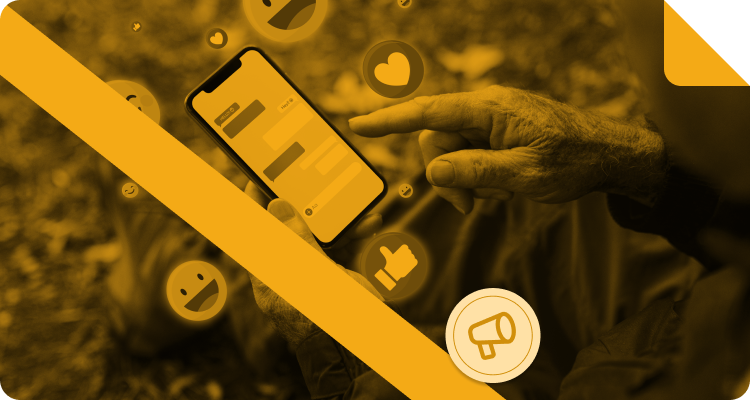The majority of the world’s population is active on their mobile phones. They are constantly communicating with their friends and relatives. So, it’s obvious that texting has become a vital part of their lives.
According to the recent report of Exploding Topics, people spend approximately 3 hours and 15 minutes of their time on smartphones daily. There is no way they can miss any message from their close ones. So, why not leverage it to market your product?
Your customers are always checking their SMS or WhatsApp messages. And using these channels for marketing can be a game-changer for your business.
Many businesses are using these channels to promote their products and services. But the remaining ones are confused about choosing the right channel.
In this SMS vs WhatsApp marketing article, we will cover the basics of these channels. In the end, we will show you which channel is better and the reason behind it.
What is SMS Marketing?
SMS marketing is a technique of sending targeted and personalised messages to customers via text messages. The intention is to promote products and services through text messages and give them real-time updates on the business.
These messages are sent to subscribers who have opted-in to receive texts from particular brands. You can use SMS marketing in two ways:
a. Promotional: These types of SMS promote new or existing products or services. You can communicate important updates, information, or the launch of a new product or service to your customers.
b. Transactional: These are ‘’one-to-one’’ messages. These messages are sent to customers to update customers about their ordered product. For example, if their order is out for delivery, they may get an update about the same along with the tracking id.
Advantages of SMS Marketing
Before businesses began leveraging SMS marketing strategies, people only used to rely on SMS to connect with their friends and families. But, as the marketing era evolved, businesses saw text messages in a new light. They began using this channel to reach their target audience and promote their products and services.
This channel goes a long way and is associated with several benefits. Let’s look at some benefits of SMS marketing today:
1. Wide Reach:
Customers don’t need a smartphone to receive text messages from brands. It’s a feature on every mobile phone. So, you can reach a large audience and target your potential customers.
2. No Internet connection:
Although the world is evolving, some people still don’t have access to the Internet; however, this isn’t a roadblock. Because no internet connection is needed for customers to receive messages. It allows your business to reach people who otherwise cannot be reached without an internet connection.
3. Simple and direct:
Text messages need to be more simple and direct. So, you don’t need to design multiple campaigns to build conversations with them.
4. Does not require an app:
The text messages feature is inbuilt, making it advantageous for brands and customers. Brands don’t need to push people to download a new app. And customers don’t have to download an extra app to receive updates from their favourite businesses.
5. Higher open rates:
SMS has an incredible open rate of 98% i.e., more brand messages are likely to be read by the audience.
These benefits of SMS marketing make it one of the strongest modes of marketing communication.
What is WhatsApp Marketing?
WhatsApp marketing is a technique where brands promote their products and services, and build relationships with customers through WhatsApp. This channel allows businesses to have real-time conversations with customers and make meaningful connections with them.
Just like SMS marketing, you can use WhatsApp marketing in the same ways:
a. Promotion: Brands like yours can use WhatsApp to promote their products, services, new launches, or business updates to customers.
b. Order Tracking: Customers can receive the tracking details and constantly check the status of their ordered products.
ALSO READ: How to do WhatsApp Marketing: An Ultimate Guide for Restaurants
Advantages of WhatsApp Marketing
Here are a few benefits of WhatsApp marketing that sets it apart from other marketing channels.
1. Multimedia features:
WhatsApp allows you to share images, audio, documents, and videos to promote your products and services. It doesn’t limit you to plain text messages. This makes your campaigns more conversational and engaging.
2. Business features:
Over the few years, WhatsApp has developed incredible features for brands. You can easily create a business profile, which will help customers differentiate from others. These features include automated messages, quick replies, real-time data, and more.
3. Global reach:
WhatsApp is used globally. Thus, it is easier to reach customers across the globe. All you will need is their data for the starters.
4. Secure messaging platform:
It has end-to-end encryption that keeps all the data secured. Moreover, it even allows you to back up your chats as and when required.
Also read: Why does your Business need WhatsApp Marketing services?
SMS Vs WhatsApp: A Comparative Analysis
Businesses use SMS and WhatsApp marketing globally. However, some factors make one channel superior to the other.
1. Personalisation
Unlike SMS, WhatsApp allows businesses to send more personalized messages to customers by using emojis and other multimedia features. It builds trust among the audience and lets the brands stay relevant.
2. Internet connection
Although WhatsApp allows you to offer personalisation, it restricts your audience reach. You can only reach customers who have an internet connection. This is where SMS marketing comes to the rescue. Because customers don’t need an internet connection to receive messages from their favourite brands.
3. Word Limit
If you want to send long messages to your customers, you cannot use SMS because it has a word limit. In SMS marketing, you need to promote your product or service in a few words; however, if you want to refrain from long messages, SMS marketing is the key.
4. Marketing formats
SMS marketing restricts you to text messages. But WhatsApp marketing allows you to use different formats like images, audio, and videos to promote your products and services.
Which Channel Should You Choose?
Although WhatsApp is more advanced than text messaging, there is no one winner here. You can use these channels for different cases. Because these channels have different benefits that can help you achieve your business goals.
For example, if you want to broadcast messages to unlimited users together, use WhatsApp. If you want to send order updates or tracking IDs, you can leverage both WhatsApp and SMS. And if you want to use simple and direct marketing, go for SMS.
It depends on the business goals and target audience. Understand the demographics and identify your goals before. So, you can choose one channel accordingly.
Wrapping Up
We hope this SMS vs WhatsApp marketing guide was helpful. Remember, before you choose any marketing channel, it is important to understand the use cases and business objectives. Both SMS and WhatsApp marketing have their own advantages. You can either choose one or leverage both channels for your marketing campaigns.
After all, the marketing era is changing. And you don’t need to stick to one channel. Moreover, it’s always best to test these campaigns on your customers and see which channel gets better responses. You can sign up on Reelo to run SMS and WhatsApp marketing campaigns and get real-time insights. Get started now!


 BACK TO BLOG HOME
BACK TO BLOG HOME





